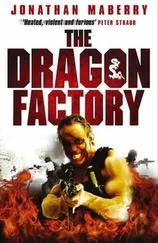Bryce Courtenay - The Potato Factory
Здесь есть возможность читать онлайн «Bryce Courtenay - The Potato Factory» весь текст электронной книги совершенно бесплатно (целиком полную версию без сокращений). В некоторых случаях можно слушать аудио, скачать через торрент в формате fb2 и присутствует краткое содержание. Жанр: Современная проза, на английском языке. Описание произведения, (предисловие) а так же отзывы посетителей доступны на портале библиотеки ЛибКат.
- Название:The Potato Factory
- Автор:
- Жанр:
- Год:неизвестен
- ISBN:нет данных
- Рейтинг книги:3 / 5. Голосов: 1
-
Избранное:Добавить в избранное
- Отзывы:
-
Ваша оценка:
- 60
- 1
- 2
- 3
- 4
- 5
The Potato Factory: краткое содержание, описание и аннотация
Предлагаем к чтению аннотацию, описание, краткое содержание или предисловие (зависит от того, что написал сам автор книги «The Potato Factory»). Если вы не нашли необходимую информацию о книге — напишите в комментариях, мы постараемся отыскать её.
The Potato Factory — читать онлайн бесплатно полную книгу (весь текст) целиком
Ниже представлен текст книги, разбитый по страницам. Система сохранения места последней прочитанной страницы, позволяет с удобством читать онлайн бесплатно книгу «The Potato Factory», без необходимости каждый раз заново искать на чём Вы остановились. Поставьте закладку, и сможете в любой момент перейти на страницу, на которой закончили чтение.
Интервал:
Закладка:
Newman begged his wife to allow the Solomon family to remain for the three months. He pointed out that he had already spent the whole amount of the year's stipend on extensions to their cottage, and had no way of paying back the twenty pounds. In addition, he observed that Ikey's contribution of rent was paying for furnishings which they could otherwise not contemplate owning. Mrs Newman, a good and faithful woman, agreed that they should honour the agreement until it expired, whereupon, she made her husband promise, Hannah and her children would be returned to the authorities and Ikey asked to leave.
Hannah heard of Mrs Newman's plans and in a state of intoxication she confronted her, shouting wildly and accusing her of ingratitude while, at the same time, threatening to tell the authorities of the unlawful financial arrangement her husband had entered into with Hannah's son.
As with many mild-mannered people who are finally provoked, this was the straw that broke the camel's back. Mrs Newman flew into a fit of fury such as had never occurred in her life and she struck Hannah repeatedly with a broomstick and drove her screaming from the cottage.
This was the moment for which the officials had been waiting. Under the governor's instructions they had been watching the goings-on in the Newman household and, at the first reasonable opportunity, had been instructed to move against the Solomons in the hope of ensnaring Ikey in some public misdemeanour. Hannah was arrested and taken to the Female Factory and her children, as they were still assigned to her care and therefore the responsibility of the authorities, taken to the orphanage.
An official investigation followed where it was convincingly shown that Hannah had never been treated as an assigned servant and that Newman, a constable and guardian of the law, had not reported as living under his roof a 'suspected' criminal who, though not positively confirmed, was thought to be the runagate Ikey Solomon.
While this was a slender enough accusation and one which would scarcely have withstood the scrutiny of even a colonial magistrate, it was sufficient to frighten Newman. In order to avoid possible censure, he claimed that Hannah's behaviour had greatly changed since the arrival of Ikey, who had on several occasions boasted to him that he had plans to take her out of the colony at the first opportunity. Newman completed his statement with the words: 'He told me that even should she be placed in the Female Factory he would use sufficient influence to free her again'.
This attempt to implicate Ikey in a conspiracy failed, but the colonial secretary, hearing of this boast by Ikey to bring about the escape of his wife, ordered that Hannah be closely confined within the Factory and never assigned as a family servant again.
Hannah once again took this to be Ikey's work, her reasoning being that, despite his constant supplications, her continued refusal to give him the combination to the safe had caused him to punish her further. Though she truly dreaded the prospect of the Female Factory, it was the loss of her children which caused her to hate Ikey even more, and she swore she would rather die than allow him the use of a single penny of their combined fortune.
Ikey, who still went officially under the name of Sloman and so was not permitted to attend the hearing, was greatly distressed at the outcome. Hannah was slipping further and further from his grasp. Though they had quarrelled incessantly since his arrival, he was certain she would eventually be persuaded to his cause. Now, with her incarceration in the Female Factory after nearly a year of freedom, her children taken from her, he knew the likelihood of his gaining her co-operation in the matter of the numbers to be severely diminished.
Ikey decided to throw all caution to the wind and appeal to the English weakness for an act of selfless nobility, and Arthur's strong desire not to waste the financial resources of the colony. He wrote directly to Arthur, dropping the name of Sloman and admitting to his real identity.
Hobart
His Excellency Colonel George Arthur
Lt. Governor of Van Diemen's Land
Sir,
I beg to State the following for Which I most Humbly hope that Your Excellency will be pleased to take into Your Consideration.
While in America I have read of my wife's unfortunate situation and, acting solely from those natural causes, feeling and affections unnecessary, I trusts, to explain to Your Excellency, I have travelled 30,000 miles, expressly to settle and pass the remainder of my life in the bosom of my family. I therefore beseech Your Excellency most humbly that You may allow my beloved wife to be assigned to me as servant as I am certain that a woman of her refined nature and frail disposition will not long survive the place of oblivion in which she is now confined to the utter discomfiture and bereavement of your memorialist.
I wish to explain to Your Excellency that in the matter of Mr R. Newman of which You are well acquainted, were it not for his constant demands for money there would be no such trumped up complaint as was brought before You. With the result that my beloved wife has been torn from the arms of her precious children and sent to that dreadful confinement which is worse than death.
I further promise Your Excellency that should You release my wife to my care I shall be happy to enter into a bond of indemnity to prove my utmost good faith on this matter.
I have the honour to Subscribe-
Your Excellency's Most Humble Servant
Isaac Solomon.
Arthur's reply was a blunt and unequivocal refusal: '… the ends of justice would be entirely defeated, if his wife, so soon after her transportation to this colony, should be assigned to her husband.'
Meanwhile, Ikey, all his life a cautious man who seldom made mistakes of judgement concerning the law, seemed so entirely obsessed with the desire to get the information he needed from Hannah that he did not appear to realise he had come to the end of his efforts and ought to be making a hurried departure from Van Diemen's Land.
Caution, and the knowledge that opportunities are seldom singular and that another occasion will always arise to gain your purpose, had always been Ikey's favoured philosophy. This patience and trust in his luck had served him well in the past. Now it seemed as if, by giving his Waterloo medal to Mary, he had sacrificed his sound judgement and good sense. It was almost as though he was under a delusion that even the determined arm of the law was not long enough to stretch across the twelve thousand miles separating London from Hobart Town.
But stretch it did and its fingers began to close around Ikey with the necessary documents relating to the issue of a warrant for his arrest arriving in Hobart.
Time has warped the facts of Ikey's arrest and different versions have come to exist to satisfy the appetites of amateur historians bent on intellectual booty. The Sydney Monitor of 17th March 1830 reported Ikey's arrest thus: At about 2 p.m. two constables, in the disguise of out-settlers, came into the shop, one of whom said he wanted some tobacco and the other a pipe. On coming in they asked for the old gentleman, as they preferred dealing with him to the young ones. Ikey, who was behind the counter, started up and said: 'I am the person,' and instantly one of the men seized him and said: 'You are the person we want.' On this apprehension, Ikey turned as pale as death, and after recovering from the stupor of a few moments exclaimed: 'So help me Heaven! I am a done man now, it's all over for me; I am done for!' He made a rush towards a desk at the upper end of the counter, on which there was lying a penknife, which he endeavoured to seize hold of, no doubt for the purpose of committing suicide, but was prevented in the attempt by the constables, to whose assistance four of the military, who were stationed outside, came with drawn bayonets and fire arms. Having rendered him powerless, they handcuffed him, and brought him before the Police Magistrate of the Colony. After identification as Isaac Solomon, he was committed to gaol, where to guard against the possibility of escape, he was heavily ironed.
Читать дальшеИнтервал:
Закладка:
Похожие книги на «The Potato Factory»
Представляем Вашему вниманию похожие книги на «The Potato Factory» списком для выбора. Мы отобрали схожую по названию и смыслу литературу в надежде предоставить читателям больше вариантов отыскать новые, интересные, ещё непрочитанные произведения.
Обсуждение, отзывы о книге «The Potato Factory» и просто собственные мнения читателей. Оставьте ваши комментарии, напишите, что Вы думаете о произведении, его смысле или главных героях. Укажите что конкретно понравилось, а что нет, и почему Вы так считаете.












